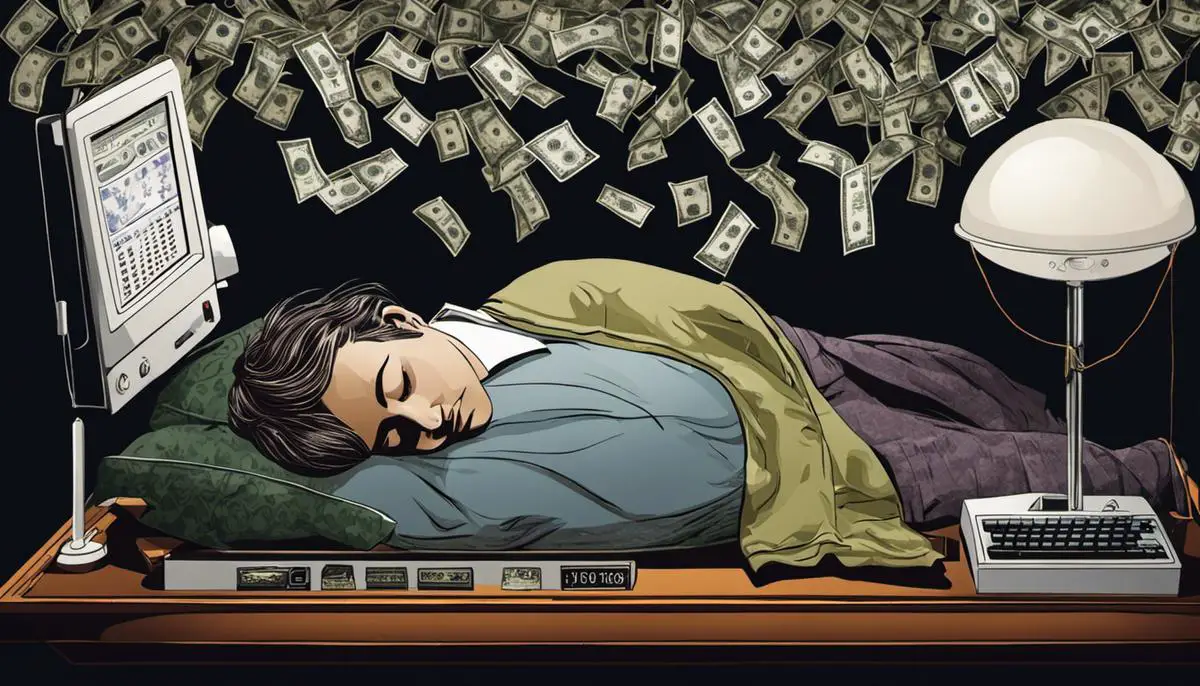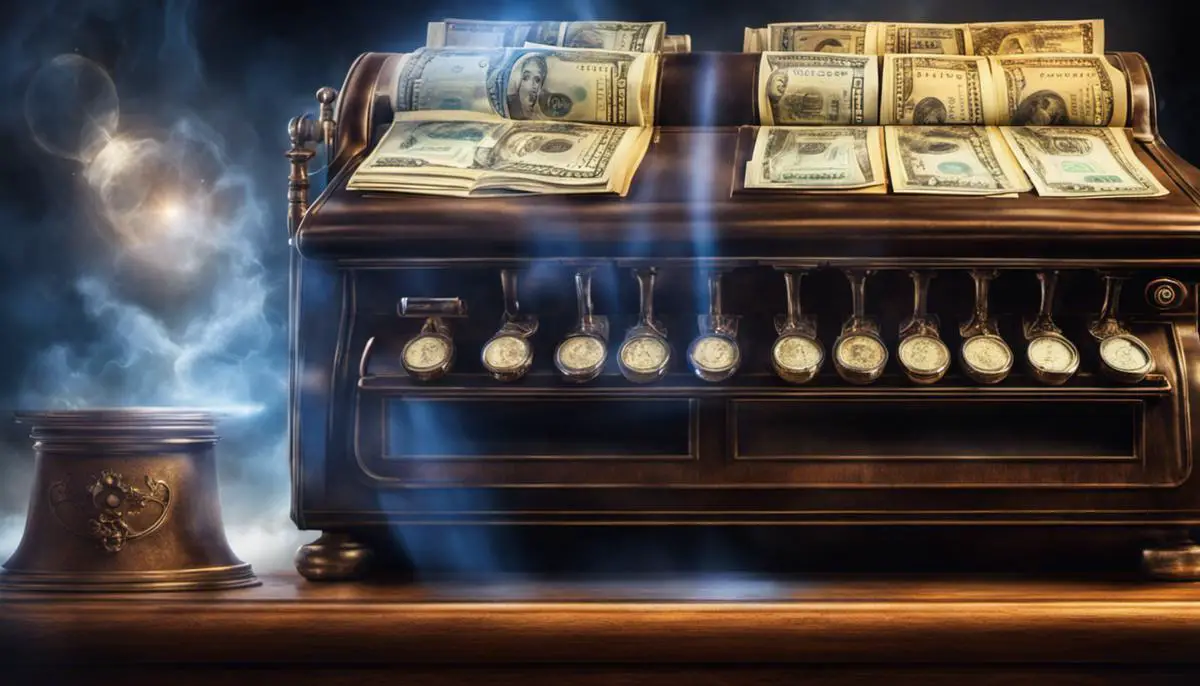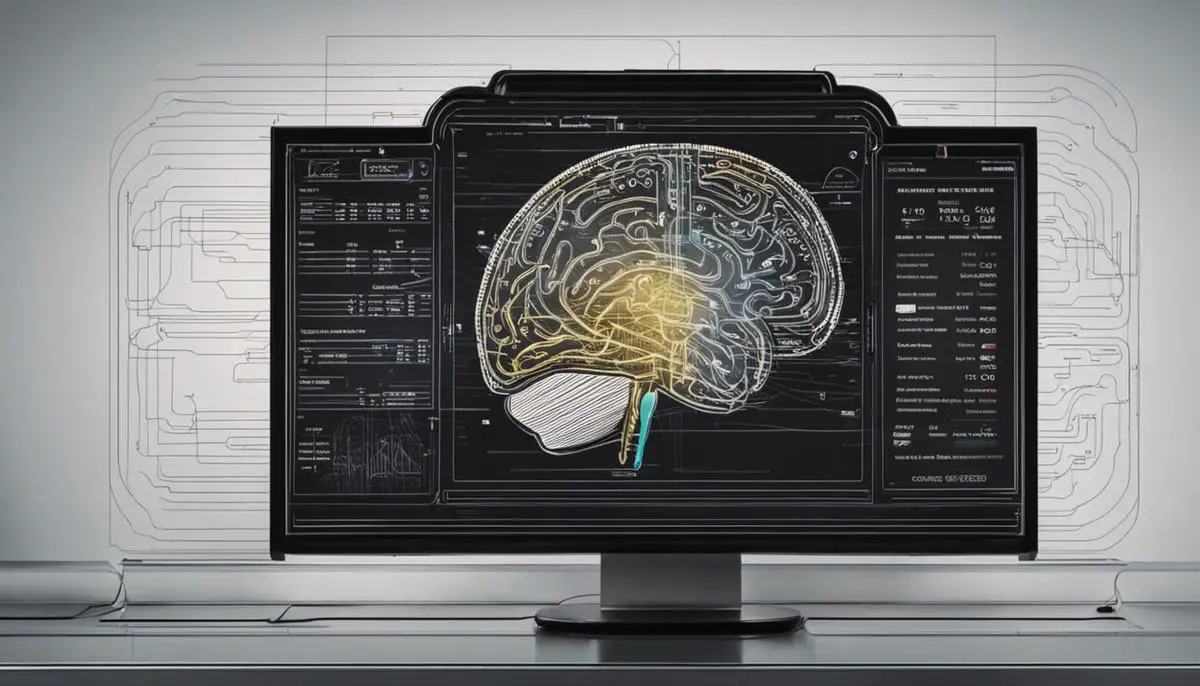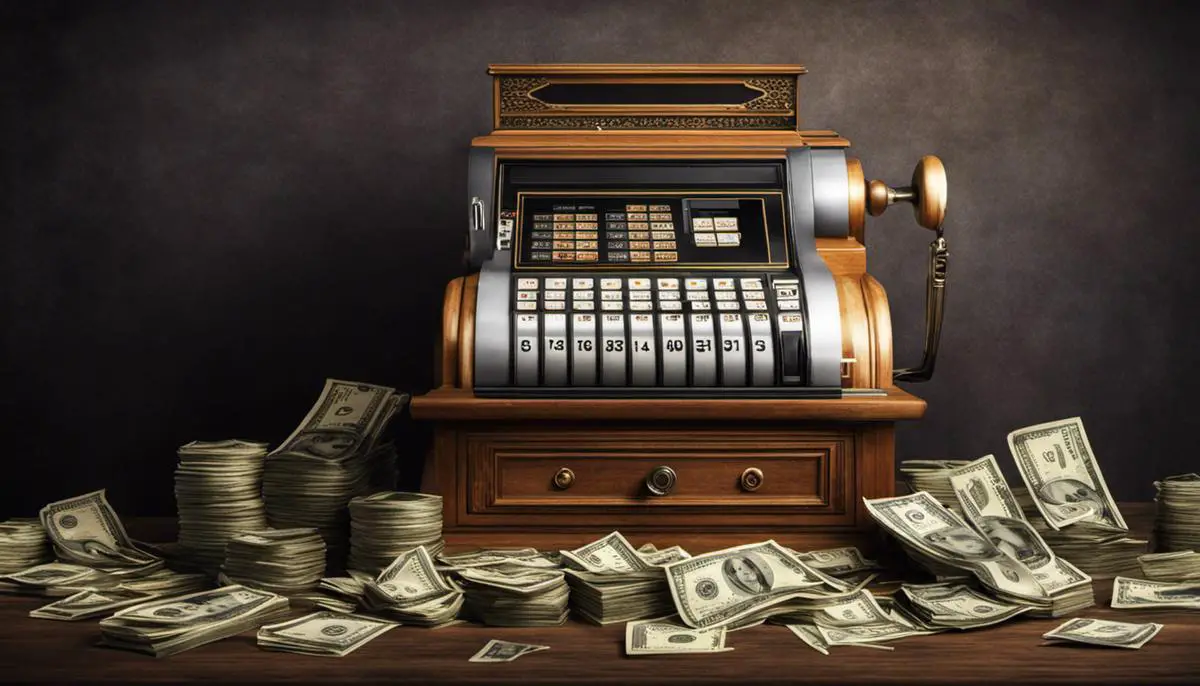The intricate landscape of our dreams often mirrors the complexities of the conscious world, providing profound insights into the human psyche. For instance, dreaming of a cash register, an object deeply entwined with notions of prosperity and resource management, could stimulate a range of interpretations from diverse perspectives. This text offers an exploration of such dreams, harnessing the lens of psychoanalysis to decode the metaphoric undertones linked to our financial anxieties and desires, tracing the sociocultural evolution of dream interpretation through historical contexts, delving into the neuroscience behind dream symbolism, and lastly, extrapolating these findings to concretize implications in real-life scenarios. In this engagement, it is not just about understanding the cash register as the focus of our dreams, but discovering more about the self, and the world around us, through the lens of these nocturnal visions.
The Psychoanalytical Perspective of Cash Register Dreams
Psychoanalytical Interpretation of Cash Register Dreams: An Inquiry
The realm of dreams has been a topic of rigorous scientific and academic investigation for centuries, providing invaluable insights into the human unconscious mind. Among the myriad symbols that appear in our nocturnal reveries, the cash register is a particularly intriguing one. This article aims to delve into the cogs and wheels of the psychoanalytical perspective to dissect dreams revolving around cash registers and their potential implications on our consciousness.
According to psychoanalytical theory, pioneered by Sigmund Freud, dreams are the ‘royal road’ to accessing the unconscious mind. Inherent in this paradigm is the belief that dreams are not random, meaningless images, but in fact, the encapsulation of an individual’s desires, fears, and internal conflicts—packaged in symbolic form to escape censorship from the conscious mind.
In the psychoanalytical interpretation, a cash register traditionally symbolizes transactions, value exchanges, and assessment. However, as is the nature of symbols, they are multifaceted, and their interpretations can change depending on the context of the dream and the dreamer’s subjective experiences.
Typically, dreams involving cash registers are believed to reflect the dreamer’s preoccupations with financial transactions in life. The cash register, an instrument of calculation and exchange, innately carries notions of accountability, precision, and balance. Consequently, the dreamer might be unconsciously identifying an imbalance or an impending calculation in their life that could be financial, emotional, or otherwise.
Consider a dream where the cash register is malfunctioning. From a psychoanalytical perspective, this could symbolize the dreamer’s anxiety and fear about losing control – perhaps regarding their finances or feeling unable to ‘balance the books’ in certain aspects of their life. Another viewpoint suggests that such a dream might reflect the individual’s feelings of being cheated or shortchanged and the fear of confronting that reality.
On the other hand, dreams where one receives more money at a cash register than expected may symbolize a subconscious sense of obtaining more than what one perceives to deserve, inciting feelings of guilt. Still, some interpret this as an optimistic foretelling of unexpected gains in the dreamer’s life. Thus, the multifaceted layers of this dream symbol make for complex interpretations that could largely depend on the dreamer’s personal life context.
In conclusion, interpreting a dream from a psychoanalytical perspective involves drilling down to the symbolic level driven by the belief that dreams veil our unconscious desires, conflicts, and fears in obscure symbolism. A stylized interpretation of cash register dreams suggests they are mostly a reflection of the individual’s subconscious concerns related to balance, accountability, and transaction. The diversity in interpretations reiterates the highly personal and subjective nature of dreams, reflecting the beauty and complexity of the human unconscious mind.
Dedicated to the discourse on dreams, this particular understanding invites further thought. It encourages the fascinating pursuit of understanding and depicting the intricate tapestry of our unconscious, one dream at a time.

Historical Context of Cash Register Dreams
Title:Reframing Our Perspective: Unraveling the Implications of Cash Register Dreams through Historical Prism
Comprehension of cash register dreams necessitates us to delve into the annals of history, taking into account the manifold historical factors defining human perception and dramatization of wealth and economic symbols. The history of the human psyche’s relationship with wealth and exchange of value, more explicitly symbolized by cash registers, stretches over the definitive periods of socio-economic progress. The transformational epochs within human civilization provide valuable insights into the intricate symbolism of cash register dreams, thus deepening our understanding of this unique dream motif.
The central role of commerce in our existence is eloquently symbolized by the cash register. The symbiosis of human consciousness and cash registers becomes especially significant when viewed through the lens of dreams. In antiquity, bartering of goods and services was common practice. In the subconscious realm, dreams might have been full of symbols such as goods, livestock, or even tokens, paralleling contemporaneous wealth exchange systems. Thus, placing cash register dreams in the historical context suggests that dreams often index the socio-economic zeitgeist of a particular epoch.
The industrial revolution altered most aspects of human existence, particularly commerce, paving the way for a newly centralized economic structure. Cash registers, a direct product of this period, were instrumental in this transition. Consequently, cash registers began appearing in dreams as representations of modern manifestations of wealth and commerce, replacing the antiquated tokens of barter systems.
The symbolism and interpretation of cash registers in dreams cannot be devoid of its historical context. The twentieth century’s rapid embrace of materialism and consumerism further instilled the cash register as an emblematic symbol of abundance and prosperity. This period saw an increasing incidence of cash register dreams. Prosperous or troubling cash register dreams increasingly indicated abundance or scarcity, prosperity or economic stress as felt by the dreamer in their waking existence.
A noteworthy feature of our neurological enigma, termed the ‘night-time cinema’, is its remarkable adaptability which allows dream symbolism to evolve synchronously with societal movements, reflecting changing sentiments towards wealth and commerce. Historical events have been seen to trigger an uptick in specific types of dreams. The Great Depression of the 1930s, for instance, led to an increase in dreams involving empty or malfunctioning cash registers, underscoring the economic hardship endured by many.
The interpretation of cash register dreams is an interplay of personal history and wider societal context, a culmination of the individual’s intimate experiences with socio-economic constructs, and the overarching historical implications of global shifts in economic paradigms. The canvas of dream interpretation is thereby markedly extended, from introspection to retrospection, enriching the depth and breadth of our understanding.
Thus, unearthing the historical undercurrents enriches our understanding of cash register dreams, illustrating how the socio-economic climate affects dream symbolism. A cash register, a seemingly mundane object, is thus networked into larger historical contexts, offering nexus points for connecting personal narratives to broader socio-economic themes. By historically contextualizing dream motifs, we are equipped to further our understanding of the powerful unconscious, navigating the vast oceans of our inner psyche.

Neuroscientific Perspective of Cash Register Dreams
A neuroscientific perspective on cash register dreams opens a veritable Pandora’s box of intriguing insights into the human psyche while dovetailing beautifully with the topics hitherto discussed in this article. While psychoanalytic theories expounded on the symbolism and subjective interpretations of such dreams, approaching this phenomenon from a neuroscience viewpoint adds robustness through a physical printing board – the brain.
The first marked instance to assert here revolves around activation-synthesis theory. This model of dream generation posits that dreams arise out of random electrical brain impulses that pull imagery from our memories. Over time, these nonsensical images amalgamate to form a semi-coherent dream narrative. From this standpoint, cash register dreams might merely be a product of residual memories – memories of money-related instances that have lodged themselves into an individual’s subconscious.
However, the dreamscape does not end here. Countless studies have illuminated how the brain’s reward centers react to the sight, touch, and even the mere thought of money. The brain’s mesolimbic system, primarily the ventral tegmental area (VTA), nucleus accumbens, and parts of the prefrontal cortex come alive when an individual interacts with money. When one dreams of cash registers, it could be a manifestation of the individual’s brain replaying transactions or interactive events related to money, stimulated by the activation of such reward circuits during sleep.
Building upon this argument, neuroscience offers an understanding of the emotional imprints within the dream narrative. The amygdala, an important emotional processing center in the human brain, significantly modulates the dream narrative. In the context of cash register dreams, the amygdala could fuel the emotional undertone – anxiety over a malfunctioning register, joy at receiving extra money, disappointment at a lack of funds, etc.
A diverging yet equally significant tangent includes cognitive neuroscientists propounding a theory known as “threat simulation.” This theory postulates that our dreaming brains are continually playing out different scenarios that may pose a danger to us, preparing us for real-life situations. Subsequently, dreams of malfunctioning cash registers could serve as training grounds for frustrating or anxiety-inducing situations in waking life related to money handling and economic transactions.
By casting a neuroscientific lens on cash register dreams, we transform understanding of these seemingly trivial night-time imaginaries to meaningful storyboards reflecting myriad facets of an individual’s cognitive, emotional, and memory processing. These insights only accentuate the intricacies orbiting the seemingly simple act of dreaming, reinforcing the importance of research and investigation in this truly beguiling realm of sleep science. The crossing paths of psychoanalysis, history, and neuroscience only underline the complexity of dreaming, mirroring the complexity inherent in every individual’s unique experience of life.

Analyzing Real-life Implications of Cash Register Dreams
In the distant realm of dreams, where subconscious thought materializes into intricate narratives, we often find knowingly perplexing symbols. Money-related imaginations, especially cash register dreams, offer an intriguing case-study. As we have navigated through psychoanalytic interpretations to historical and societal context, it has become evident that a multifaceted understanding of such dreams is astoundingly intricate. To continue this captivating exploration, we will now delve into the neural mechanisms implicated in these dreams.
The Activation-Synthesis theory, put forth by Robert McCarley and J. Allan Hobson, offers a pivotal structure to understand our dreams. They posit that during our REM sleep, random electrical brain impulses pull images from our stored memories, thereby formulating dreams. Applying this to cash register dreams, the notion of ‘residual memories’ becomes significant. Such dreams may well be an echo of recent experiences associated with money transactions, a direct imprint of the day’s residue on the dream canvas.
To further analyse, neuroscientific research suggests that the brain’s reward centers – the ventral striatum and the dorsolateral prefrontal cortex – may be involved in money-related dreams. A person might encounter a dream of a cash register when the reward system of their brain is activated during sleep, as it associates the symbol of a cash register with gaining a reward, like money. However, if the dream involves a malfunctioning cash register, could it indicate a threat to the expected reward?
In this respect, Antti Revonsuo’s theory of threat simulation may be of potential relevance. According to this ‘evolutionary ground-zero’ of dreaming, our brain generates threatening situations as ‘virtual reality simulations’ in dreams, helping us prepare for real-life threats. Arguably, a malfunctioning cash register in dreams could be the brain’s way of simulating a potential financial threat. Here, we ought to highlight that the amygdala, a central hub for processing emotions in the brain, may shape the emotional undertones of such dreams, perhaps eliciting feelings of anxiety or disappointment.
Without a doubt, the neuroscientific perspective cultivates a transformative understanding of dreams, complementing the psychoanalytic interpretations and their historical transformation. The amalgamation of psychoanalysis, history, and neuroscience offers a profoundly comprehensive lens to study dreams. Nonetheless, the complexity and the opaque nature of dreams underscore the necessity of relentless investigation and research in this realm.
While some may argue that disentangling the convoluted puzzle of dreams is a herculean task, those embarking on this quest find a virtuous journey of discovery awaiting them. As scholars and scientists, it is our undying curiosity that propels us to strive, break boundaries and perpetually reach toward a more profound comprehension of human consciousness. Maybe, eventually we can answer the fundamental question – how can we translate the recognition of cash register dreams into tangible implicates for the real world, thereby providing a touchstone for the dreamer’s waking life? Here is to hoping that the chalice of knowledge never runs dry and our quest for understanding continues to illuminate the intricate maze of dreams.

The subtleties of our dreams are reflections of our deepest thoughts and emotions, playing out in metaphoric narratives. Understanding a dream of a cash register, therefore, is a journey of self-discovery, opening doors to introspect on our relationship with financial stability, wealth and power. Moreover, it gifts us a historical and sociocultural aid to grasp wider societal constructs around these concepts and demystify the intricate neuroscientific aspects which contribute to the formation of such dreams. As we unravel the meanings embedded within our dreams of cash registers, we equip ourselves to apply these insights to everyday scenarios and decisions, fostering a more deliberate and inward-looking perspective of life. Ultimately, dreams, even those as seemingly mundane as one involving a cash register, present a rich tapestry of symbols that bestow upon us an enriched understanding of our collective and individual human experiences.
